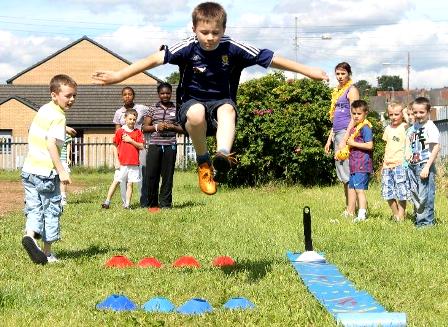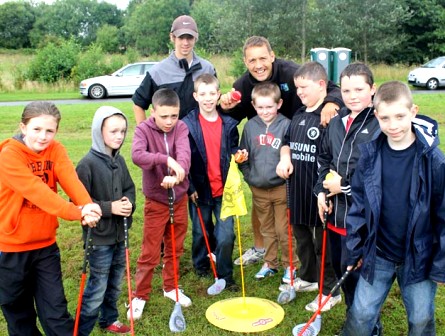
Leaping for legacy: Glasgow is aiming to start now to secure CWG impact
Cann do: getting Glasgow’s legacy in early
Challenged to write a positive article about the local legacy of mega-games in the UK in the 21st century, Mick Owen took one glance at the sporting almanac and headed for Glasgow for a conversation with ng2’s Greg Cann.

Leaping for legacy: Glasgow is aiming to start now to secure CWG impact
Well before the summer’s hoopla had even started in East London the zeitgeist-makers in Scotland had begun to talk up the 2014 Commonwealth Games to anyone who would listen. Whether you view that as an Alex Salmond-inspired dirty trick aimed at securing votes for independence or the natural enthusiasm of the Scottish marketing industry for something big, bright and shiny, there is little doubt that north of the border “the Games” has long meant Glasgow 2014, not London 2012.
The marketers will not find it easy to differentiate Glasgow’s Games from its southern predecessor – after all a website is a website and there is only so many three-word combinations you can cobble together to make a strapline – but one arena where “the Commonwealths” are already out-distancing “the Olympics” is in legacy planning and delivery.
As soon as England knew the Games were due in London, sports development practitioners started to demand funding from the centre to support legacy projects. As soon as Glasgow won their Games people like Greg Cann, individuals who bestride the worlds of community development and sport, found themselves in demand.
At first sight Cann is an unlikely candidate to be running a regeneration project in Springburn, one of “Glasgow’s most notorious areas” according to Wikipedia. He started his career as a sports development officer at Liverpool John Moores University and moved to his present role as North Glasgow Sports Legacy Co-ordinator from the development department of the Scottish Rugby Union. Worse, he is from Devon and has neither picked up a Caledonian twang nor adopted any of the “wee sayings” of his new home so there seems little chance of him blending in and less chance of him being accepted.
Given that his latest role is aimed at creating “new opportunities in physical activity, sport, training and volunteering” and the driving partner in the project is North Glasgow Homes, the second largest housing association in the city whose focus is the health and wellbeing of the people who live in their housing stock, the expectation might be that Cann would be from a community or social care background and that he would look and sound like the people he is there to serve.
In truth he does have a background in community development, having weaved spells in a Garston youth club and the Liverpool Sport Action Zone into his career alongside the jobs in mainstream sport. However, having experienced first hand the differing structures and approaches of national governing bodies of sport (NGB), his views on such governing bodies hint that he expects to be more at ease in his new role.
“My boss said, ‘Greg, I want you to be a maverick’,” Cann explains. “For years I have fought and fought against management forcing us down specific routes so that was manna from heaven for me.”
Despite this laissez-faire approach from his manager, Cann is still expected to make some form of impact but again the expectations would not be familiar to practitioners working within the context of a local authority or NGB. “How will we measure impact? Well, numbers aren’t the bigger picture, that’s for sure. Impact is engagement, enjoyment, personal development. For some kids just getting them to be involved, to smile, to not swear, to come back the following week; that’s impact. The governing body big picture of getting young people to join a club is definitely on our list but it’s not a major reason we do what we do.”
Warming to his theme, Cann explains why the mainstream approach to sports development will not always work in Springburn and environs: “Initially in my area we had five or six clubs across all sports, all football, only two of which had junior/youth sections, and a very small cricket club. That means if kids are going to join clubs they have to travel and go out of the area.” Given that one of the characteristics of the communities Cann serves is a marked disinclination to leave their geographical area, the link to “outside” clubs will always remain tenuous.
The improbability of young people from Springburn and Possil joining the kind of club beloved of national governing bodies of sport must make working with Cann an unattractive proposition for NGB officers. He does, however, maintain the links he made as a member of the NGB set and is optimistic about achieving some benefits with and for mainstream sports.
“If a governing body is set up appropriately to work in a community then there is no problem,” he says. “In my personal opinion some of the smaller governing bodies are better suited to this context because they have not lost the personal touch. They are willing to work innovatively and flexibly because they have to in order to get attention. I think some of the larger governing bodies don’t need to because plenty of people are attracted to their offer regardless. They know they are going to get numbers so why be flexible, why be innovative?”
For ‘innovation’ read ‘change’, something sports people can get very nervous about but which Cann sees as absolutely necessary. “Take racket sports,” he says. “To engage kids with racket sports we need to repackage them. If we can set up two or three racket sports, say, and a chill-out music zone we can bring people in from the dark and the wet to listen to the music and then encourage them to participate in an activity, but that doesn’t have to be a game. You just play against one of your mates. There is a chance that a game might get changed but fundamentally you’re still knocking a ball over a net.”
With the Games on the doorstep and London’s heroes available, does he envisage using the sporting ambassador idea? Here again he slips from the script used by so many national sporting agencies: “Andy Murray? Fantastic. Chris Hoy? Not a problem, but they are role models for people who have sport in their DNA. Chris Hoy? He is from Edinburgh. He’s not from round here and he may as well be from the moon. Where are local role models?” It seems this is not a hypothetical question. “There is a young lad, an athlete who is pushing for 2014 selection now, who is from Springburn, as well as a local gymnastics coach, a member of the Scotland netball squad and a pro boxer living locally. These are the role models I’m going to use.”
While Cann is knocking cherished concepts into the long grass it is a good time to ask him what legacy learning has come his way from London. Cann is unconvinced that the carnival itself will produce any direct benefit on his patch but he seems determined to use the promise of it, the buzz, to drive forwards as much change as possible before the circus moves on. “Commonwealth Games steering groups look at London and there is a lot we can learn about their likely influence on Scotland and on Glasgow. But is the legacy going to come from the Games themselves or will legacy come from work on the ground, setting things up which use the Games as a hook?”
Finally, his focus turns to volunteering, another canard beloved of the agencies that strategise about sport: “In the past local authorities and governing bodies have gone into areas to do lots of taster sessions, lots of short programmes to get people to ‘join our club’,” he explains. “And it doesn’t work. To make it work, to have a long-term effect, you need local leaders, parents, volunteers.”
So far, so standard but where in a disintegrating community do you find leaders? “We have a strong link with the further education community, a college which offers sport right in the middle of my area, and I need to get them involved and develop local leaders. We need role models, school sport leaders, anything and anybody that will click with the community here. If we are going to make North Glasgow a better place to live, work and invest in, which is ng homes’ strapline, then Greg Cann who is white, middle class and comes from England isn’t going to do it. It’s going to be someone from Possil, someone from Springburn who knows the area, knows the issues, knows the kids and how to motivate them.”
Stripping away the persiflage of sport is one of Cann’s favourite strategies and no sacred cow is safe in his path or his presence. So does he have anything good to say about sport? “My project is about adding value so the question is, what can sport add to a smoking cessation programme or an obesity group? How can we use sport and physical activity, especially when people aren’t very ‘sporty’? It’s not about ‘you must play five-a-side football’ or ‘you must play in a team or join a club’. It’s about walking groups and the like. It’s not about sport: it’s about a social activity based on some form of physical activity.”
With the programme for the 2013 Scottish Sports Development Conference being made available at the same time as this interview is being published it would be interesting to see whether anyone invites Greg Cann to Cumbernauld to offer his perspective. With his name on the programme one or two more seats might be sold but would anyone be sitting comfortably?
Greg Cann is the North Glasgow Sports Legacy Coordinator a post created by a partnership involving the North Glasgow Housing Association, ng2 Ltd, Glasgow Life and the Winning Scotland Foundation. He can be contacted on gcann@ng2works.com
The Leisure Review, December 2012
© Copyright of all material on this site is retained by The Leisure Review or the individual contributors where stated. Contact The Leisure Review for details.
Download a pdf version of this article for printing
